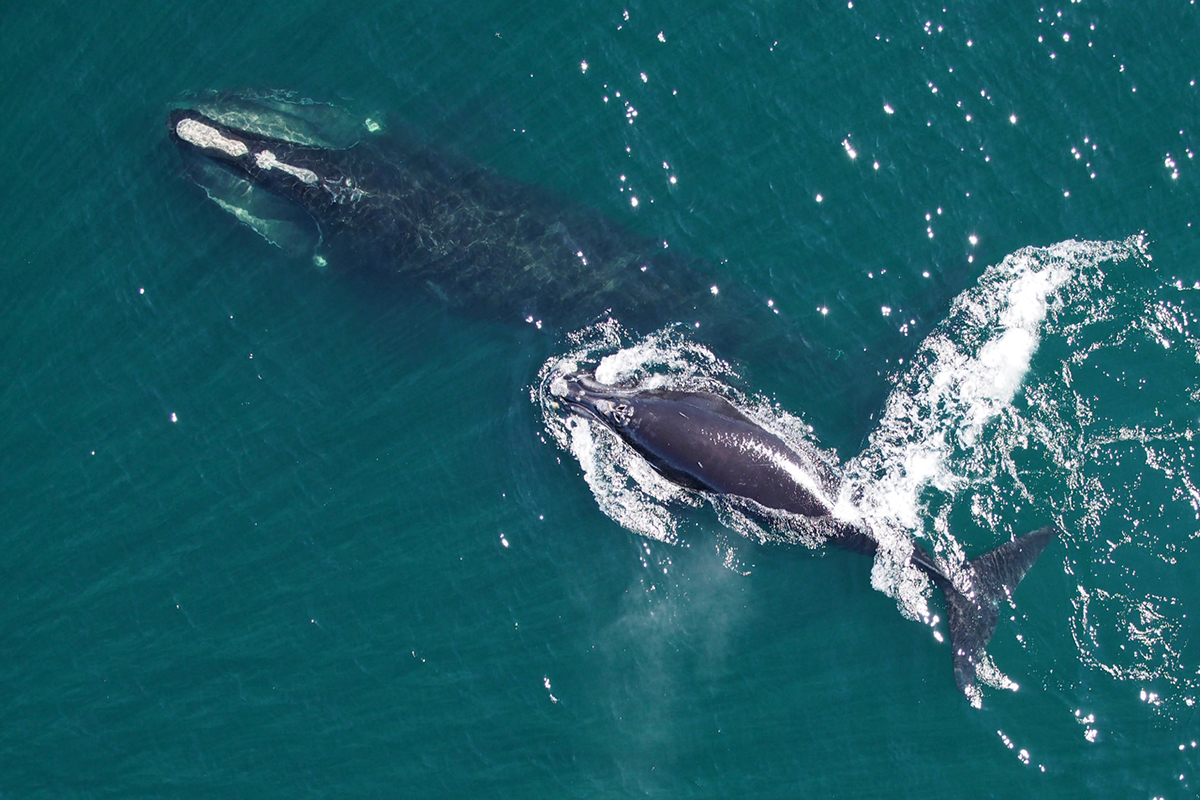
A proposed federal rule designed to add another layer of protection for a critically endangered species of whale has been taken off the table.
The National Oceanic and Atmospheric Administration, or NOAA, announced last week its withdrawal of proposed speed limits for vessels under 65 feet long in waters used by North Atlantic right whales.
Supporter Spotlight
NOAA’s National Marine Fisheries Service, or NMFS, has been reviewing the proposed rule for more than two years, during which time it received some 90,000 public comments.
In a brief statement, NOAA said those comments reflected “views on all sides of the issues addressed.”
“Despite its best efforts, NMFS does not have sufficient time to finalize this regulation in this Administration due to the scope and volume of public comments,” NOAA said in a release put out days before President-elect Donald Trump’s inauguration Monday.
The decision drew immediate and sharp criticism from conservation groups advocating for additional North Atlantic right whale protections. Opponents of the proposal praised the agency’s decision, saying the speed limit would have resulted in economic losses.
Vessel strikes and entanglement in fishing gear are the leading causes of injuries and deaths to North Atlantic right whales, scientists say.
Supporter Spotlight
Only about 370 right whales remain in existence.
Following NOAA’s announcement, Oceana Campaign Director Gib Brogan fired off a statement calling the withdrawal “bureaucracy at its finest.”
“North Atlantic right whales don’t belong on our beaches, and they don’t deserve to die because of political incompetence and a blatant disregard for science-backed solutions,” he said in a release. “We hate to state the obvious but, we need a solution, and we need it now. It’s our sincere hope that the new administration does not want the first large whale to go extinct in centuries in U.S. waters because of federal red tape. The Trump administration must find a solution that keeps fisheries on the water, sustains the marine economy, and supports the recovery of the North Atlantic right whale.”
At least 16 North Atlantic right whales have been injured or killed in collisions with boats and ships since 2020, according to information provided by conservation groups. The fatalities include two females and dependent calves that died last year.
Last month at least three right whales were entangled in fishing gear. One of those, a juvenile male, was seen about 40 miles off the North Carolina coast. The other two, an adult female and adult male, were spotted off the Massachusetts coast.
“The gross inaction and delays by this administration over the past four years to release this rule is inexcusable,” Conservation Law Foundation Senior Counsel Erica Fuller stated in a release. “We exhausted every avenue available to us to move this forward as the right whale body count from vessel strikes continued to grow.”
The Conservation Law Foundation joined the Center for Biological Diversity, Defenders of Wildlife and Whale and Dolphin Conservation in resubmitting a petition calling for National Marine Fisheries Service to beef up its 2008 speed rule. Specifically, the petition asked the agency to apply the rule to additional areas in which right whales are known to travel and include speed limits to smaller vessels.
“Research has shown that a vessel traveling at 10 knots or less is much likely to harm a whale in a collision,” according to a joint statement released by the environmental organizations.
Opponents of the proposed rule argue that right whale injuries and deaths from vessel strikes are caused by ships that fall under the current speed limit rule.
Congressman Greg Murphy, R-N.C., fought the proposed expanded speed limit, one he called “unscientific and ridiculously burdensome” in a statement released by his office last week.
“The Biden Administration pushed this rule even though it knew that the vessels it targeted were not responsible for the death of Right Whales,” Murphy said. “Regardless they pushed it on to the bitter end. Eastern North Carolina understands the importance of being good stewards of our environment while utilizing our God-given resources to help grow our economy and provide for our families. This is a tremendous victory for our fishermen, boaters, and countless businesses in our coastal economy who would have been devastated if this rule went into effect.”
If the rule were to be enforced, it would have affected nearly 16,000 vessels, 810,000 jobs and $230 billion in economic activity, according to Murphy’s office.
Current speed regulations require vessels 65 feet or longer, with the exception of government, law enforcement and some foreign boats and ships, to reduce speed to 10 knots in designated areas and during specific seasons along the U.S. East Coast.
But conservation groups contend few vessels actually comply with the rule.
“NOAA Fisheries has kept the right whale waiting for improved vessel strike protections for years,” Defenders of Wildlife Senior Attorney Jane Davenport said in a release. “In attempting to make everyone happy, the agency turned years of delay into an outright denial of the needs of a critically endangered species. The agency has a mandate to protect the right whale, but ran out the clock, leaving the whale with an out-of-date rule that we know is not enough.”
Kristen Monsell, oceans legal director at the Center for Biological Diversity, called NMFS’s withdrawal of the proposed rule “cowardice and politics.”
“The agency’s inaction means that more right whales will suffer and die,” she said in a release. “The survival of these whales as a species depends on more protections from deadly ship strikes and deadly entanglements in fishing gear. If we don’t curb these manmade threats, these beautiful animals will vanish forever.”







